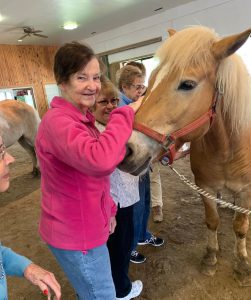Horses Bring Joy, Calm to Methuen Village Residents

Six Methuen Village Assisted Living residents who are living with dementia and/or Alzheimer’s disease recently experienced a relaxing day getting to know three horses at Ironstone Farm in Andover, courtesy of its Equine Therapy program.
“Touch Therapy, as it is called, is a relatively new form of therapy that I was interested in providing to our Compass Memory Support residents. I had seen the benefits firsthand within our own community when I had a therapy dog come and visit with the residents a few months ago. I immediately noticed during the visit that the residents were all calm, and not agitated, but rather just focused on the animal and caring for her,” says Kristen LaBrie, Director of Methuen Village’s Compass Memory Support Programming. “It is very common for a person with Alzheimer’s or dementia to feel agitated or anxious, as they begin to become disoriented and feel disconnected from the world. Touch therapy is beneficial in helping with this because the act of petting an animal produces an automatic relaxation response, as it is rhythmic and repetitive for the person.”
This therapy is a non-pharmacological approach to improving the resident’s physical or emotional well-being without needing to use medications. Another benefit is that the horses encourage communication and provide comfort to a person who may be experiencing communication difficulties, which are common in dementia.
“We had one woman who spent the entire session petting one horse’s head and saying, ‘I love you’ over and over, and then a man who simply stood by the horse, pet him occasionally, and asked questions to the employees about the horses, their living situations, etc.,” LaBrie explained. “We came to find out that this man’s father has owned a farm when he was a small child, and that was why he was so inquisitive regarding the logistics of animal keeping. One of the main benefits of animal therapy is simply that it stimulates memories for those with Alzheimer’s and related dementia. Touching the animal and being in the presence of one allows them to reminisce about their memories that include animals, childhood pets they may have had.”
LaBrie noticed that residents who usually search for sensory input or become agitated and angry were calm, smiling and even speaking to the horses. The residents who normally, due to confusion and disorientation, are exit seekers were engaged, happy and pleased to stay in the barn. LaBrie adds that the visit also impacted the residents’ food intake, as upon returning on their meal – another known benefit of Touch Therapy.
The mission of Ironstone Farm is to provide therapeutic, educational, and recreational opportunities using horses and the working farm environment to help individuals achieve optimum quality of life.